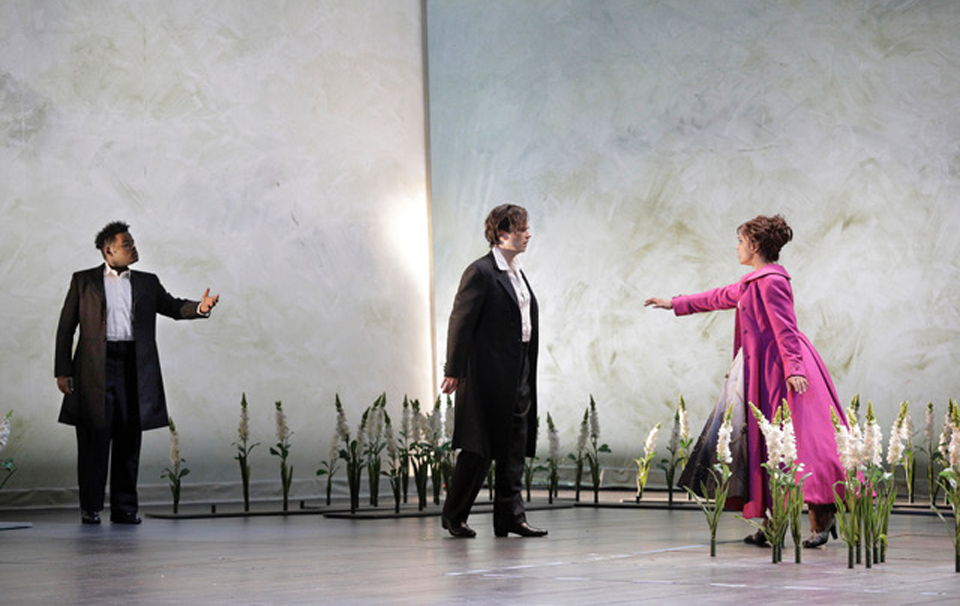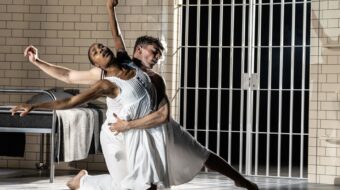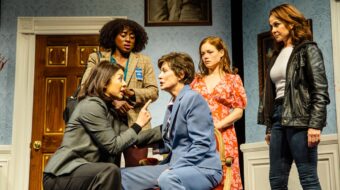
LOS ANGELES—LA Opera’s world premiere of composer Matthew Aucoin and librettist Sarah Ruhl’s sublime Eurydice is an optically and aurally stunning reinterpretation of the ancient Greek myth about Orpheus (baritone Joshua Hopkins) and the title character (Danielle de Niese, but substituted on Feb. 14 by Erica Petrocelli). Like Romeo and Juliet, there have been many versions of this immortal romance derived from Greek mythology.
Composer Christoph Willibald von Gluck and librettist Pierre-Louis Moline’s 1774 opera Orpheus and Eurydice graced the LA Opera season at the Dorothy Chandler Pavilion in 2018. 1959’s Black Orpheus is a Brazilian-set film. Ruhl’s 2003 play based on the legend has been performed at regional U.S. theaters and in the UK. Many other renditions exist, including Jean Cocteau’s screen trilogy, part of which Philip Glass adapted into a 1991 chamber opera.
There’s a reason why this myth continues to haunt us, just as Shakespeare’s “star-crossed lovers” have: Along with Romeo and Juliet, the saga of Orpheus and Eurydice is simply one of the greatest love stories of all time. And the great news for opera lovers is that Aucoin and Ruhl’s operatic iteration is a stellar retelling of the epic story of the musician who literally dares to go to hell to rescue his beloved.

Contemporary “remakes” of ancient Greek works often miss their mark. But this modern-dress edition is right on target. While it succeeds in retaining the theme and flavor of the myth that can be traced all the way back to the sixth century BCE, Aucoin and Ruhl’s work manages to re-imagine the age-old tale for 21st-century audiences through the conventions of the operatic medium.
Eurydice also borrows heavily from conventions of the horror movie genre, with scenery designer Daniel Ostling’s sensational sets expressing the Underworld, complemented by Ana Kuzmanic’s costuming of Hades’ inhabitants, both in their LA Opera debuts. But when the curtain lifts for Eurydice we find the ill-fated lovers not in hell but sunning themselves in bathing suits at a beach resort (perhaps they’re holidaying in the Greek islands?), where the poet pops the question.
This sets the stage for what’s to come. To make a long myth short, at the lovers’ wedding, Hades, Lord of the Underworld (played with Josh Gad-Jack Black-ish panache by high tenor Barry Banks), lures Eurydice to hell. And in one of the great tributes to love in mythological history, our man Orpheus courageously embarks on the River Styx to fetch his betrothed way down yonder in Hades’ dim domain.
Ruhl’s storyline departs sharply from the original telling by emphasizing the titular female lead, whereas previously Orpheus had been the protagonist. Ruhl adds a complex subtext revolving around Eurydice’s Father (baritone and LA Opera veteran Rod Gilfry). Indeed, one might think at times this is more like watching a retelling of the Electra myth, rather than Orpheus’s. Ruhl wrote the original play during the period after the loss of her own father.
If one of the themes of the myth is the peril of looking back to recover what has been lost, now it is also Eurydice who looks back (to her father), thus equally sharing the responsibility for the permanence of the loss of marital love.
The opera also introduces a character called “Orpheus’s Double” (countertenor John Holiday), who appears, according to Aucoin’s program note, “when [Orpheus] goes into his musical trance, or shows flashes of his superhuman ability….” (Interestingly, Hopkins is white while his character’s benevolent Doppelgänger Holiday is Black.)
During their sojourn in the Underworld, our underdog Earthlings encounter bizarre otherworldly denizens of hell, including three wonderfully costumed rocky characters—Little Stone (soprano Stacey Tappan), Big Stone (mezzo-soprano Raehann Bryce-Davis), and Loud Stone (tenor Kevin Ray), who render some charming songs and stage special FX.
The music, conducted with verve by composer Aucoin, ranges from the lush to chilling, with LA Opera stalwart Grant Gershon directing the chorus. Mary Zimmerman does magical work directing the oversized cast in her superb LA Opera debut. The choreography is by Denis Jones, with mood-setting lighting designed by T. J. Gerckens, both in their LA Opera debuts. Although there are supertitles, Eurydice is sung entirely in English.

Eurydice has some interesting lines about what it’s like to be in love with an artistic genius whose focus is more on his work than on his romantic partner. But although Ruhl’s libretto is written by a woman and focuses on the female character, feminists’ antennae may rise at this archetypal depiction, thousands of years old, of male-female relationships. Orpheus is not only endowed with musical and poetic brilliance but is admirably, staggeringly heroic in his death-defying derring-do, seeking to retrieve his beloved from the realm of the dead. On the other hand, is Eurydice worth his sacrifice? She can be seen as capricious and inconstant, and in Ruhl’s retelling, suffering under an extreme father complex. Still, Ruhl assigns agency to Eurydice’s action, which had been largely absent from earlier tellings.
Nevertheless, this jaw-dropping modern update of a myth dating back to antiquity is an eye- and ear-popping operatic extravaganza that’s not to be missed by opera lovers. The work was co-commissioned and -produced with the Metropolitan Opera, a supreme achievement for a MacArthur Fellow composer not yet 30 years old and from whom great work is expected. Sarah Ruhl and Mary Zimmerman are also MacArthur winners, giving some indication of the high cultural stratosphere occupied by this new work.
A sneak peek promotional video can be viewed here.
Eurydice is being performed two more times: Thurs., Feb. 20 at 7:30 p.m. and Sun., Feb. 23 at 2:00 p.m. at the Dorothy Chandler Pavilion, 135 N. Grand Ave. For tickets and more information: (213) 972-8001 or the LA Opera website.

MOST POPULAR TODAY


Communist Karol Cariola elected president of Chile’s legislature

Zionist organizations leading campaign to stop ceasefire resolutions in D.C. area

Afghanistan’s socialist years: The promising future killed off by U.S. imperialism

High Court essentially bans demonstrations, freedom of assembly in Deep South






Comments